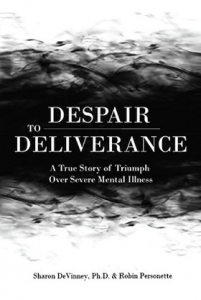Despair to Deliverance: A True Story of Triumph Over Severe Mental Illness by Sharon DeVinney, Ph.D. and Robin Personette is a fascinating book dually written by a therapist and her client. Robin – a mental health care worker herself – had a breakdown, where she considered suicide. Dr. DeVinney was considering writing a book about the case, but was concerned about breaching the doctor-patient divide, until Personette herself expressed interest in writing about her story. The result is this collaboration, which covers the path out of depression from the perspective of both doctor and patient in a way that should be helpful both to those suffering from psychiatric issues, and those who treat them.
There are obvious boundary issues that come with such an undertaking, as one becomes immediately concerned with doctor-patient confidentiality. Even if Personette consented to writing the book, it could potentially give future patients pause. DeVinney covers this issue immediately in the book, and makes a convincing case. She writes, “While boundaries are crucial, it is equally important to know when those boundaries need to be extended for the sake of the client.” The book itself is proof that this was an important undertaking. It may be unconventional, but sometimes it’s necessary to break convention for progress to be made.
In Part One, “Despair,” we learn of Personette’s breakdown, termed her “Meltdown,” most specifically her suicidal thoughts, which seem to come out of nowhere. Dr. DeVinney is deeply concerned and considering electro-shock treatment – described as less invasive and barbaric than the commonly-held belief about the practice. DeVinney is very open about her own feelings, in a way that takes getting used to, as one expects a doctor to be more clinically detached, but it is a reminder that doctors are very much human, even as they put on an objectively clinical exterior.
We then get Personette’s perspective herself, in which she describes her depression in detail, and what triggered it, and the ups and downs that come with treatment. DeVinney and Personette bond on a personal level that transcends the doctor-patient relationship, such as recording music for each other, though DeVinney is careful that this dynamic is not taken too far. Some may argue that the fact that this book exists at all breaches the divide, but anyone suffering from depression – and bi-polar disorder specifically – will be able to both empathize with Personette, as well as forgive themselves if treatment does not prove to be an overnight solution. Family members as well will be able to better understand the treatment process.
What makes Despair to Deliverance so useful is how it humanizes the treatment process – it puts a human face on the doctor’s relationship with the patient, the patient’s struggle with their own personal issues, and the doctor and patient’s relationship with each other. Rather than a dry retelling of a patient’s issues, as you would find in a DSM case study, in which the bare bones of a patient’s problems are addressed, here we dig into every facet of a patient’s concerns – what their home life was like, work life, and much more – rather than just a simplistic declaration of “She was suffering from depression.” In doing so, the book unveils the difficulty with treating depression, and how such a long path it can be to “deliverance.”
Overall, the book is perhaps more effective a tool for patients than for doctors. Certainly, there is much for other psychologists to glean from this unorthodox relationship, but it is Personette’s story first and foremost – a story that is both instructive and inspiring.
Links
Author Site
Amazon
Goodreads
STAR RATING
Design
Editing
Content
Get an Editorial Review | Get Amazon Sales & Reviews | Get Edited | Get Beta Readers | Enter the SPR Book Awards | Other Marketing Services
























Leave A Comment